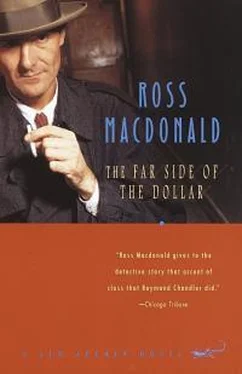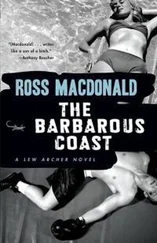“No. He was feeling really low, after the accident and all, and the terrible row with his parents. I didn’t ask him any questions. I guess I should have, shouldn’t I? I always do the wrong thing, either by commission or omission.”
“I think you do the right thing more often than most.”
“Mother doesn’t think so. Neither does Dad.”
“Parents can be mistaken.”
“Are you a parent?”
The question reminded me of the sad boys in Laguna Perdida School.
“No, I never have been. My hands are clean.”
“You’re making fun of me,” she said with a glum face.
“Never. Hardly ever.”
She gave me a quick smile. “Gilbert and Sullivan. I didn’t know detectives were like you.”
“Neither do most of the other detectives.”
Our rapport, which came and went, was flourishing again. “There’s one other thing I’ve been meaning to ask you, Stella. Your mother seems to believe that Tommy wrecked her car on purpose.”
“I know she does.”
“Could there be any truth in it?”
She considered the question. “I don’t see how. He wouldn’t do it to me, or her, unless–” She looked up in dark surmise.
“Go on.”
“Unless he was trying to kill himself, and didn’t care about anything any more.”
“Was he?”
“He may have been. He didn’t want to come home, he told me that much. But he didn’t tell me why.”
“I might learn something from examining the car. Do you know where it is?”
“It’s down in Ringo’s wrecking yard. Mother went to see it the other day.”
“Why?”
“It helps her to stay mad, I guess. Mother’s really crazy about Tommy, at least she used to be, and so was Dad. This business has been terribly hard on them. And I’m not making it any easier staying away from home now.”
She got to her feet, stamping them rapidly. “Mother will be calling out the gendarmes. Also she’ll kill me.”
“No she won’t.”
“Yes she will.”
But she wasn’t basically afraid for herself. “If you find out anything about Tommy, will you let me know?”
“That might be a little tough to do, in view of your mother’s attitude. Why don’t you get in touch with me when you can? This number will always get me, through my answering service.”
I gave her a card.
She climbed down the ladder and flitted away through the trees, one of those youngsters who make you feel like apologizing for the world.
I MADE MY way back to the Hillmans’ house. It resembled a grim white fortress under the lowering sky. I didn’t feel like going in just now and grappling with the heavy, smothering fear that hung in the rooms. Anyway, I finally had a lead. Which Hillman could have given me if he’d wanted to.
Before I got into my car I looked up at the front window of Tom’s room. The Hillmans were sitting close together in the niche of the window, looking out. Hillman shook his head curtly: no phone call.
I drove into town and turned right off the highway onto the Main street. The stucco and frame buildings in this segment of town, between the highway and the railroad tracks, had been here a long time and been allowed to deteriorate. There were tamale parlors and pool halls and rummage stores and bars. The wet pavements were almost empty of people, as they always were when it rained in California.
I parked and locked my car in front of a surplus and sporting goods store and asked the proprietor where The Barroom Floor was. He pointed west, toward the ocean: “I don’t think they’re open, in the daytime. There’s lots of other places open.”
“What about Ringo’s auto yard?”
“Three blocks south on Sanger Street, that’s the first stop-light below the railroad tracks.”
I thanked him.
“You’re welcome, I’m sure.”
He was a middle-aged man with a sandy moustache, cheerfully carrying a burden of unsuccess. “I can sell you a rainproof cover for your hat.”
“How much?”
“Ninety-eight cents. A dollar-two with tax.”
I bought one. He put it on my hat. “It doesn’t do much for the appearance, but–”
“Beauty is functional.”
He smiled and nodded. “You took the words out of my mouth. I figured you were a smart man. My name’s Botkin, by the way, Joseph Botkin.”
“Lew Archer.”
We shook hands.
“My pleasure, Mr. Archer. If I’m not getting too personal, why would a man like you want to do your drinking at The Barroom Floor?”
“What’s the matter with The Barroom Floor?”
“I don’t like the way they handle their business, that’s all. It lowers the whole neighborhood. Which is low enough already, God knows.”
“How do they handle their business?”
“They let young kids hang out there, for one thing – I’m not saying they serve them liquor. But they shouldn’t let them in at all.”
“What do they do for another thing?”
“I’m talking too much.”
He squinted at me shrewdly. “And you ask a lot of questions. You wouldn’t be from the Board of Equalization by any chance?”
“No, but I probably wouldn’t tell you if I was. Is The Barroom Floor under investigation?”
“I wouldn’t be surprised. I heard there was a complaint put in on them.”
“From a man named Hillman?”
“Yeah. You are from the Board of Equalization, eh? If you want to look the place over for yourself, it opens at five.”
It was twenty past four. I wandered along the street, looking through the windows of pawnshops at the loot of wrecked lives.
The Barroom Floor was closed all right. It looked as if it was never going to reopen. Over the red-checked half-curtains at the windows, I peered into the dim interior. Red-checked tables and chairs were grouped around a dime-size dance floor; and farther back in the shadows was a bandstand decorated with gaudy paper. It looked so deserted you’d have thought all the members of the band had hocked their instruments and left town years ago.
I went back to my car and drove down Sanger Street to Ringo’s yard. It was surrounded by a high board fence on which his name was painted in six-foot white letters. I pushed in through the gate. A black German shepherd glided out of the open door of a shack and delicately grasped my right wrist between his large yellow teeth. He didn’t growl or anything. He merely held me, looking up brightly at my face.
A wide fat man, with a medicine ball of stomach badly concealed under his plaid shirt, came to the door of the shack.
“That’s all right, Lion.”
The dog let go of me and went to the fat man.
“His teeth are dirty,” I said. “You should give him bones to chew. I don’t mean wristbones.”
“Sorry. We weren’t expecting any customers. But he won’t hurt you, will you, Lion?”
Lion rolled his eyes and let his tongue hang out about a foot.
“Go ahead, pet him.”
“I’m a dog lover,” I said, “but is he a man lover?”
“Sure. Go ahead and pet him.”
I went ahead and petted him. Lion lay down on his back with his feet in the air, grinning up at me with his fangs.
“What can I do you for, mister?” Ringo said.
“I want to look at a car.”
He waved his hand toward the yard. “I got hundreds of them. But there isn’t a one of them you could drive away. You want one to cannibalize?”
“This is a particular car I want to examine.”
I produced my adjuster’s card. “It’s a fairly new Dodge, I think, belonged to a Mrs. Carlson, wrecked a week or so ago.”
“Yeah. I’ll show it to you.”
He put on a black rubber raincoat. Lion and I followed him down a narrow aisle between two lines of wrecked cars. With their crumpled grilles and hoods, shattered windshields, torn fenders, collapsed roofs, disemboweled seats, and blown-out tires, they made me think of some ultimate freeway disaster. Somebody with an eye for detail should make a study of automobile graveyards, I thought, the way they study the ruins and potsherds of vanished civilizations. It could provide a clue as to why our civilization is vanishing.
Читать дальше












